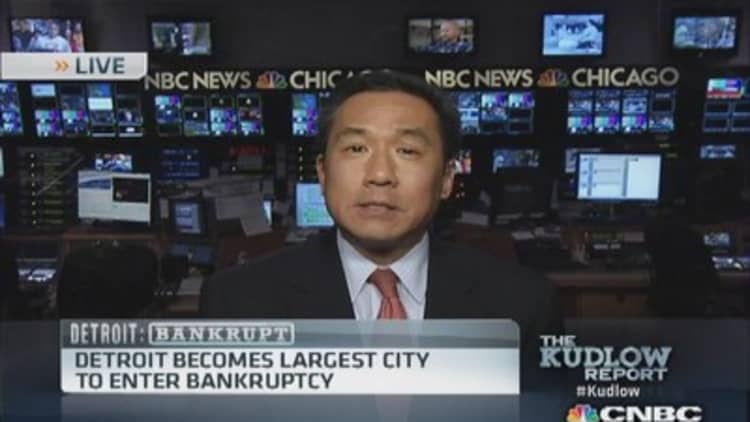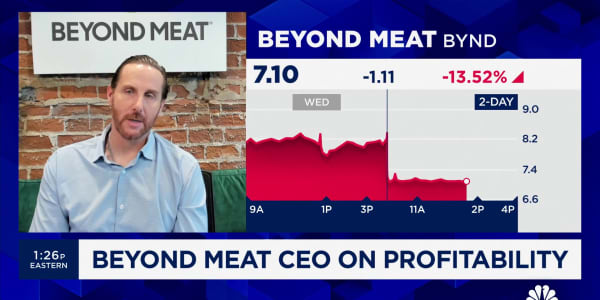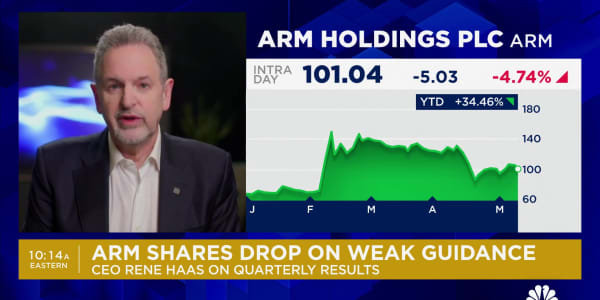Fiscally distressed governments across the country may have gotten a troubling blueprint this week for getting out of their respective messes.
In allowing Detroit to move ahead with its planned bankruptcy filing, federal Judge Steven Rhodes sent a message to municipal bondholders that their investments are not risk-free and in fact could suffer dramatic losses
Bond pros are worried about the implications.
"If they allow Detroit (general obligation) bondholders to be impaired significantly, this could cause in Michigan and maybe also municipalities across the country their GO bondholders to have the perception that this could happen anywhere," said Patrick Stoffel, municipal bond analyst at Wells Fargo.
"That could increase borrowing costs for municipalities and issuers," he added. "It could cause prices of GO bonds to be affected in the market, and so there are some possible wide-ranging implications from this Detroit bankruptcy."

(Read more: Detroit's next battle: Who foots the bill?)
Stoffel cautions that municipal bankruptcies are messy, costly and have wide-ranging after-effects, so he doesn't see Rhodes' ruling—if upheld—to lead necessarily to a rash of other cities filing.
However, for investors in governments teetering on bankruptcy, the implications could be substantial.
"Municipalities that have gone through bankruptcies before have not gone about impairing bondholders necessarily as a means to solve their fiscal problems," he said. "This is much different than what we've seen before. I could see there being some impact on the municipal market generally speaking more so than we've seen in other bankruptcies."
(Read more: Fitch: More muni downgrades than upgrades in 2014)
The Detroit case could get messier yet.
Rhodes indicated some unease over whether the city did enough to negotiate with its creditors, possibly providing appeals ground for bondholders.
Richard Larkin, director of credit analysis at HJ Sims, said the situation over the long run actually could discourage other municipalities from seeking bankruptcy protection.
"If this is the future for Detroit, it doesn't necessarily set the tone for the future for other state and local governments; Detroit has yet to feel the fiscal pain of being treated as a pariah by the municipal bond market over the long term," Larkin said in an analysis for clients.
"Speculators and hedge fund managers may profit from (debtor-in-possession) financings for now, but how accepting will the municipal bond market be after the exit from bankruptcy and bondholders get 'stiffed' for lending to the city when it was in need?" he added. "In particular, if I was a bondholder that bought Detroit's pension obligation bonds a few years back, I would be enraged and insulted at how they are going to be treated in bankruptcy."
There was little immediate reaction from the municipal market as investors waited to see what the long-term effects would be.
The Pimco Intermediate Municipal Bond exchange-traded fund lost a bit of ground Wednesday and is down 4.1 percent for the year, underperforming the Barclays Municipal Bond Index, which is off 2.3 percent. The past three months, though, have been positive for the muni market.
As for Detroit, Larkin has long held that the the city does not need to go the bankruptcy route. In August, he listed 10 misconceptions about its financial status along with recommendations on what it could do to recover.
However, he believes Tuesday's decisions set the city on a dangerous path.
"While there have been changes in the makeup of the municipal bond market in recent years," he said, "I don't believe that those changes have enough permanency to assure Detroit that they will be able to borrow long-term in the future, as we know they will need to do if they seriously want to repair their infrastructure and eliminate the blight that is poisoning this once-thriving metropolis."
—By CNBC's Jeff Cox. Follow him on Twitter @JeffCoxCNBCcom.






